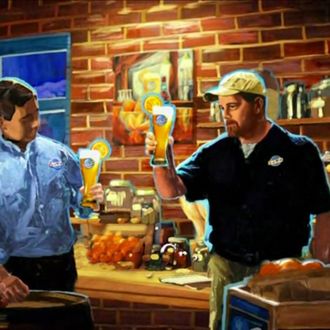
I will readily admit that I do not have the greatest taste in music, but for a while, I quite liked the self-titled debut album from the folksy-pop band the Lumineers. Until, that is, their songs began appearing all over ads. Now I can’t hear “Ho, Hey” without thinking of Blue Moon beer.
Most of us have endured the commercialization of a favorite song, and it’s the subject of a new paper in the journal Psychology and Marketing. University of Virginia marketing professor Cynthia Fraser showed 81 college students five different ads, some with familiar background music (like that VW Beetle Super Bowl ad with the tiny Darth Vader, which featured the Star Wars villain’s theme) and others with unfamiliar music (like an AT&T commercial featuring “Fanfare for the Common Man,” a classical work by composer Aaron Copland).
One week later, she brought the students back into the lab, played the songs, and asked them what came to mind. With the familiar music, the students were more likely to recall the brand; with the unfamiliar music, they were more likely to recall the message the ad was trying to get across. “Bottom line — advertisers can choose familiar, popular music, which evokes autobiographical memories, if the goal is longer term brand recognition from hearing the music in the future,” Fraser explained in an email, “or they can choose unfamiliar, classical music, which evokes impersonal images, if the goal is for audience members to learn the advertised message.”
Those of us who are not advertisers may be curious: Why does this happen, and is there a way to undo this connection — to hear the song with fresh ears, the way you once did? Alas, not really, said Fraser in her email::
We process familiar music longer, because it evokes autobiographical memories that are more interesting that the ad message. With more processing time focused on the music, there is more opportunity for the brand link to form. Also, because familiar music is already stored in our brains along with images of people, events, etcetera, the existing network is easier to attach the brand to.
It’s not clear from this paper whether this effect is long-term, as the researchers only checked in with the students the one time, just a week later. But emerging evidence from my own Lumineers-related research suggests that, yes, this effect is long-term, if not permanent.




